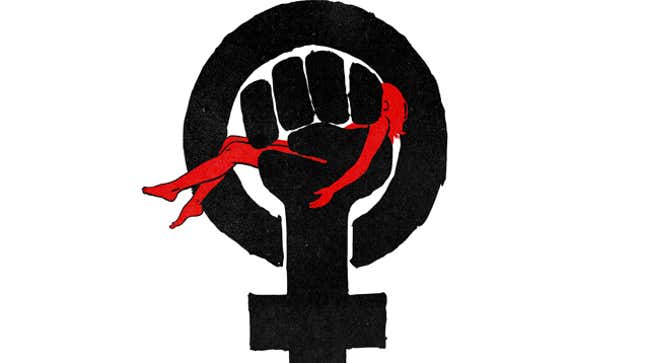What Happens When a Prominent Male Feminist Is Accused of Rape?
Latest

Late on the evening of January 6, nine women and one trans individual met at a union space in Northeast Portland to call out a well-known local activist for being, in their consideration, a wolf in sheep’s clothing. They were about to share with four dozen strangers highly personal stories of sexual and emotional abuse that inspired shame and rage. Some had seen each other at activist rallies or on Bike Swarm trips around Portland, though only a few had formally met beforehand. Despite this, they had a common denominator: The same self-proclaimed male feminist had abused them, and they wanted to make sure it wouldn’t happen to anyone else.
These 10 individuals, all feminists, were the focus of a “fishbowl meeting”: a meeting formation made up of a closed inner circle inside a horseshoe-shape of community members. The four dozen people around the victims, mostly participants in Portland bike collectives, were there to offer support and strategize a community plan of action. Over the next two hours, the victims told harrowing stories of harassment, domination, and crossed boundaries. Although this wasn’t planned, the stories increased in severity throughout the night and culminated with the tale of Byrd Jasper (not their legal name), a trans person whose recent Facebook post spurred the meeting.
“This is going to be a call out,” it read. “Hart Noecker is a manipulator and an abuser… On several occasions he got me wasted and either did things I had said a hard no to or told me of his intentions to do them in the future.” After lengthy discussions about consent, the post said, Noecker had choked and anally penetrated Jasper, despite determined and persistent warnings that anal sex was off-limits during their pre-sex conversation about boundaries. The post added that Noecker is particularly dangerous because of his “extensive knowledge of radical politics and social capital on the activist scene.”
Some women met him online, where he wore his activist credentials like a badge of impunity. Most met him at biking events or activist rallies, where he was outspoken about a number of social justice issues. The Willamette Week, a local Portland newspaper, reports that he was passionately opposed to water fluoridation, certain local highway projects, driving cars, the police, and the mayor of Portland, Charlie Hales.
The six victims I interviewed described Noecker as charismatic, with an intensity in his eyes and a passion for ethical living. Originally from Michigan, he strove for an anti-capitalist lifestyle, the pinnacles of which were his militant veganism and leadership in the biking community. Noecker, 34, was also known to take photographs at activist events, and disturbingly, of naked women at Portland’s World Naked Bike Ride. The most recent event he spearheaded was Don’t Shoot PDX, a Ferguson solidarity protest. For his day job, Noecker worked in a call center.
A self-professed male feminist, Noecker was fluent with women’s issues such as body-image politics, female silencing and, most chillingly, consent. His radical-activist blog, Rebel Metropolis (briefly removed but now back), praised Alice Walker, Emma Goldman, and Julia Ward Howe. He wore a pin with a feminist fist. He was, in many ways, the image of a male ally.
Noecker’s victims argue that his behavior represents larger trends in the idea of “macktivism,” a strategy men use to pursue female activists and progressives. Their stories differed in levels of violence, but their narrative arcs were the same: He talked himself up as a radical feminist and ally, slowly introduced controlling behavior, and, while intoxicated, crossed sexual boundaries his victims had expressly laid out (and some that didn’t need to be).
Some women in the fishbowl meeting accused Noecker of non-consensually penetrating them without a condom. Some said he had followed them into a bathroom and forced himself on them. Some said he masturbated next to them after they refused sex. A few allege that he urinated on them or forced them to urinate on him. Byrd Jasper, who believes themself to be his last victim, has accused him publicly of rape and is pressing charges.
These alleged assaults, the victims stressed, were nearly all prefaced by lengthy discussions about consent. Many of his victims maintain that Noecker instigated these discussions, asking before physical contact what their “likes and dislikes” were. Jasper, during this conversation, said they were a hard “no” on anal sex, an imperative they say Noecker violated when he was drunk. Amy, another victim, says Noecker blamed her for wearing a tiny shirt after she called him out for suddenly groping her. Later, she says, he nonconsensually penetrated her without a condom, a recurrent complaint throughout my interviews with individuals he dated.
-

-

-

-

-

-

-

-

-

-

-

-

-

-

-

-

-

-

-

-

-

-

-

-

-

-

-

-

-

-

-

-

-

-

-

-

-

-

-

-








































